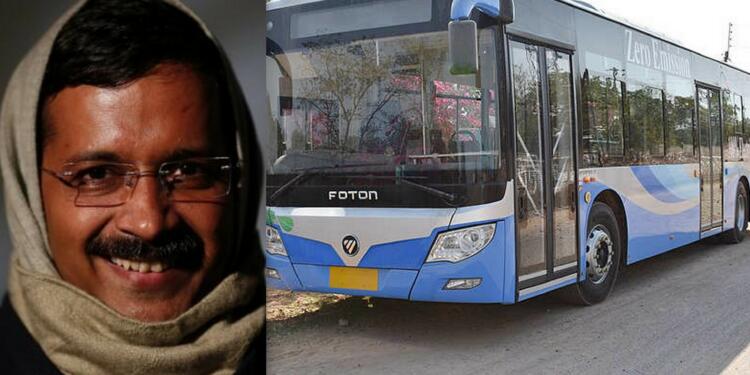After 7-years of coming to power, Delhi CM Arvind Kejriwal seems to be finally implementing his promises. Although, on the face, it’s only tokenism in the wake of upcoming assembly elections. In his latest stunt, Kejriwal has announced the implementation of his Electric bus plan.
First electric bus in Delhi
On Monday, 17th of January (2022), Arvind Kejriwal flagged off the first electric bus in Delhi. Transport Minister Kailash Gahlot was also present at the occasion. The bus will be added to the fleets of Delhi Transport Corporation (DTC) buses connecting the Delhi.
The bus is number E-44 and it is a low floored AC bus. Facilities include a ramp for the disabled besides, CCTV and panic button. It gets charged within 60 to 90 minutes. After one round of charging, the bus can run a total of 120 kms. It will run between IP Depot and Pragati Maidan.
https://twitter.com/ArvindKejriwal/status/1482986879804854275?s=20
AAP plans to launch more such buses
Speaking on the occasion, Kejriwal announced that it’s first such Bus in Delhi. According to him, it’s a new era in state’s transport. He also added that it’s the first bus to be deployed for DTC in the last 10 years. Kejriwal termed his launch as ‘havan’ and he is expecting that more and more buses will be launched.
Read more: Arvind Kejriwal has appointed men with hose pipes to clean the Yamuna
Making another exorbitant announcement of launching more than 2,000 such buses, Kejriwal said, “I believe gradually electric buses will replace the old buses. It is a major step towards controlling pollution in the city. It is noise-free and has zero emission… By April, we expect another 300 buses to reach Delhi. Our target is to run around 2,000 more electric buses in the coming years,”
BJP calls it a publicity stunt
Meanwhile, BJP has hit out at Kejriwal for the launch. The party’s main criticism centres around the launch being a token event since only one bus will be running on the road. BJP MP Manoj Tiwari said, “Had Delhi procured 11,000 buses – 6,000 e-buses and 5,000 CNG-propelled buses – citizens would have had clean air to breathe.”
Read more: [Exposed] Arvind Kejriwal’s Hollow Claims about Shortage of Funds to Tackle Pollution
A tale of Kejriwal and his freebies’ promises
Ever Since Arvind Kejriwal entered into politics, people had high expectations from him. He did not look like a normal politician and did not mince his words before criticising. His offbeat look and educated background (IITian and IRS officer) were the main factors propelling his election campaigns.
Read more: AAP-The Party that demanded Lokpal be ratified but shies away from declaring its own assets
Kejriwal had relied on exorbitant promises in order to gain votes. Free electricity, free water, free Wi-Fi, a free pilgrimage for senior citizens and waiver of development charges for new water and sewer connections were key pillars of his election promises. Moreover, he also made some impossible looking promises like pollution-free Delhi. These freebies became the main reasons behind Delhites selecting him to lead their state.
Promises are only election stunts
However, Kejriwal’s promises did not turn out to be real in an absolute sense. Water quality is degraded and many areas of Delhi face acute water shortages throughout the area. The government sometimes is forced to fix a time and quota for the availability of water in a particular area. In 2020, Zee News had revealed how citizens were constantly paying for electricity in Delhi. Other promises like pollution-free Delhi is still a dream.
Read more: Kejriwal’s freebies mutate into giant potholes and mini rivers on Delhi roads
In fact, the electric bus which Delhi CM has launched is late by 3 years. According to his 2018 promise, Kejriwal should have launched it in 2019 itself. Moreover, just one bus being added to the fleet speaks volumes about Kejriwal’s seriousness on the issue.
Kejriwal’s freebies may garner him votes in the short run, but ultimately, it’s not good for the politicians as well as the people. If freebies were better options, people would print notes in order to spend money. In a welfare state, some reallotment measures are necessary, but they should not become a tool for election campaigns.





















